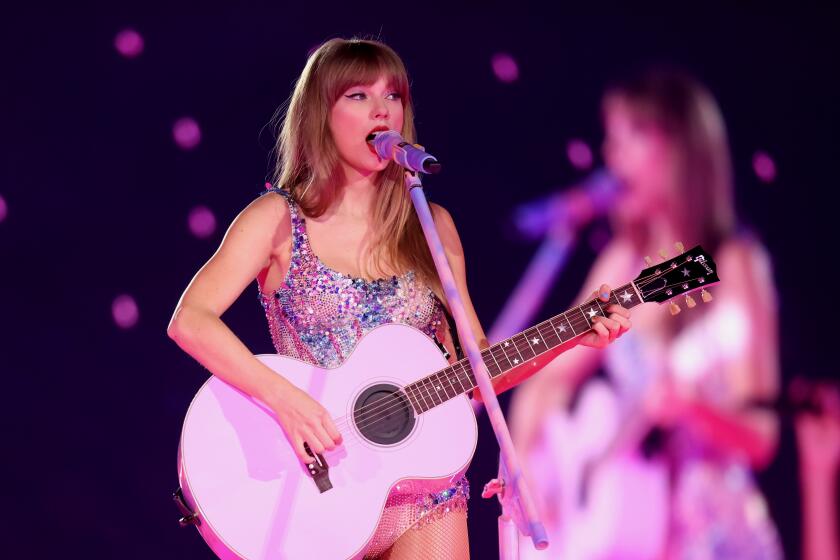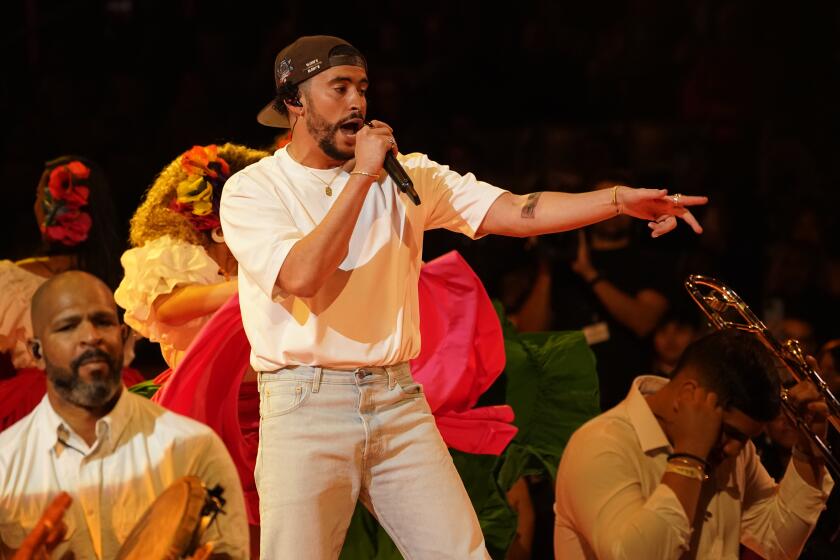With co-signs from reggaeton’s titans, Myke Towers sets sights on Latin music stardom
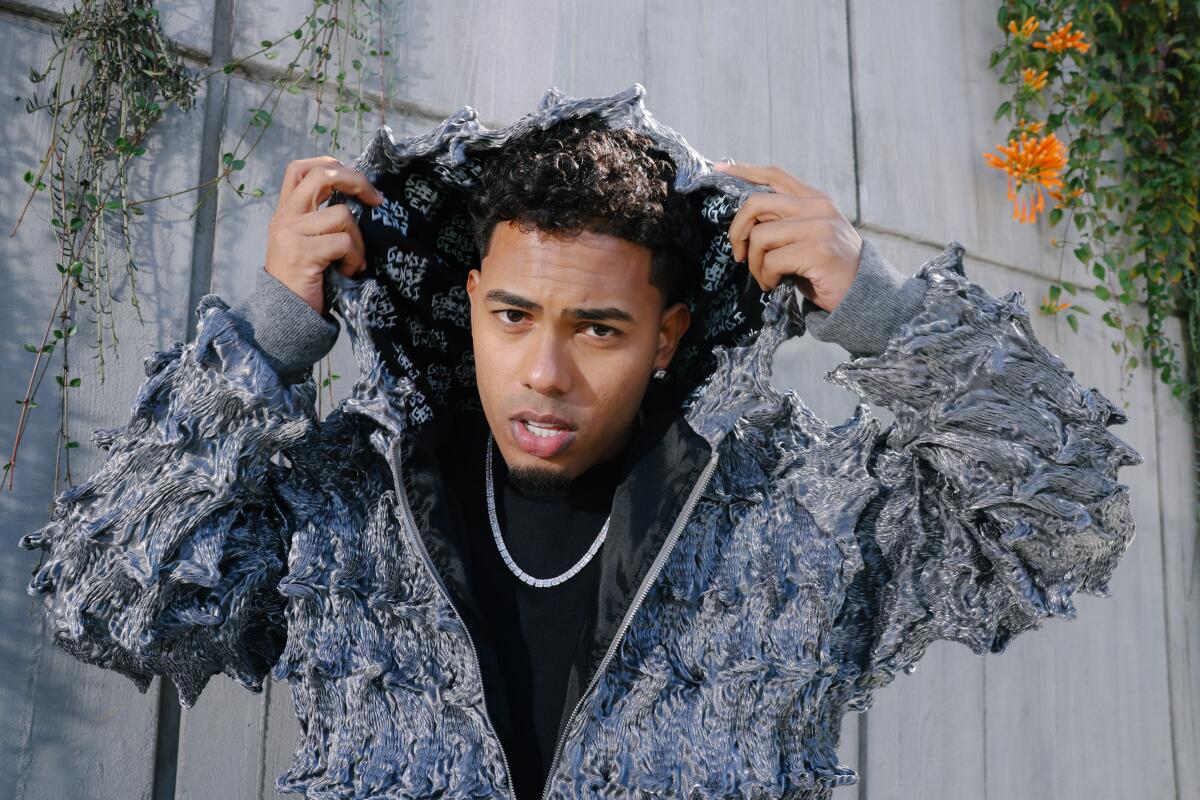
- Share via
Outside the Crypto.com Arena in January, a frenzy of young Latinos assembled for Calibash, L.A.’s annual festival for música urbana, hosted by local radio station Mega 96.3.
With his performance sandwiched between MCs Jhay Cortez and Arcángel, 29-year-old rapper Myke Towers, the spitfire from Río Piedras, Puerto Rico, was raring to rise above the pack before thousands of Angelenos.
Onstage, Towers emerged from a cloud of fog sporting a large pair of canary yellow sunglasses and the stride of a heavyweight boxing champ. He kicked off his 30-minute set with the first song that landed him in the U.S. Latin mainstream: “Si Se Da,” a reggaeton earworm that he wrote with hitmaker Farruko in 2019. Two songs in, though, Towers opted to ditch the statement shades — if he’s going to make a good impression, he decided, it’s more effective to meet his audience eye to eye.
A couple of days earlier, inside the lobby of the 1 Hotel West Hollywood on Sunset Boulevard, Towers approached in a gray tracksuit with a spiky texture, like the surface of the moon. The March 23 release of his third studio album, “La Vida Es Una,” or “Life Is One,” has been delayed twice, due in part to his relentless pursuit of perfection.
“I gave myself a brutal headache,” said Towers, born Michael Torres, of whittling down his initial 50 tracks to his final 23.
“La Vida Es Una” (which could also be taken to mean “You only live once”) is a graduation ceremony of sorts for Towers. With his chart-topping 2020 debut, “Easy Money Baby,” and 2021 follow-up, “Lyke Mike,” Towers set himself apart with a streetwise Spanish flow, cribbed directly from New York rappers like the Notorious B.I.G. and 50 Cent. Yet with a little sugar, and a simmering dembow beat, Towers’ gristly timbre elasticized into a warm, caramelized tone all his own.
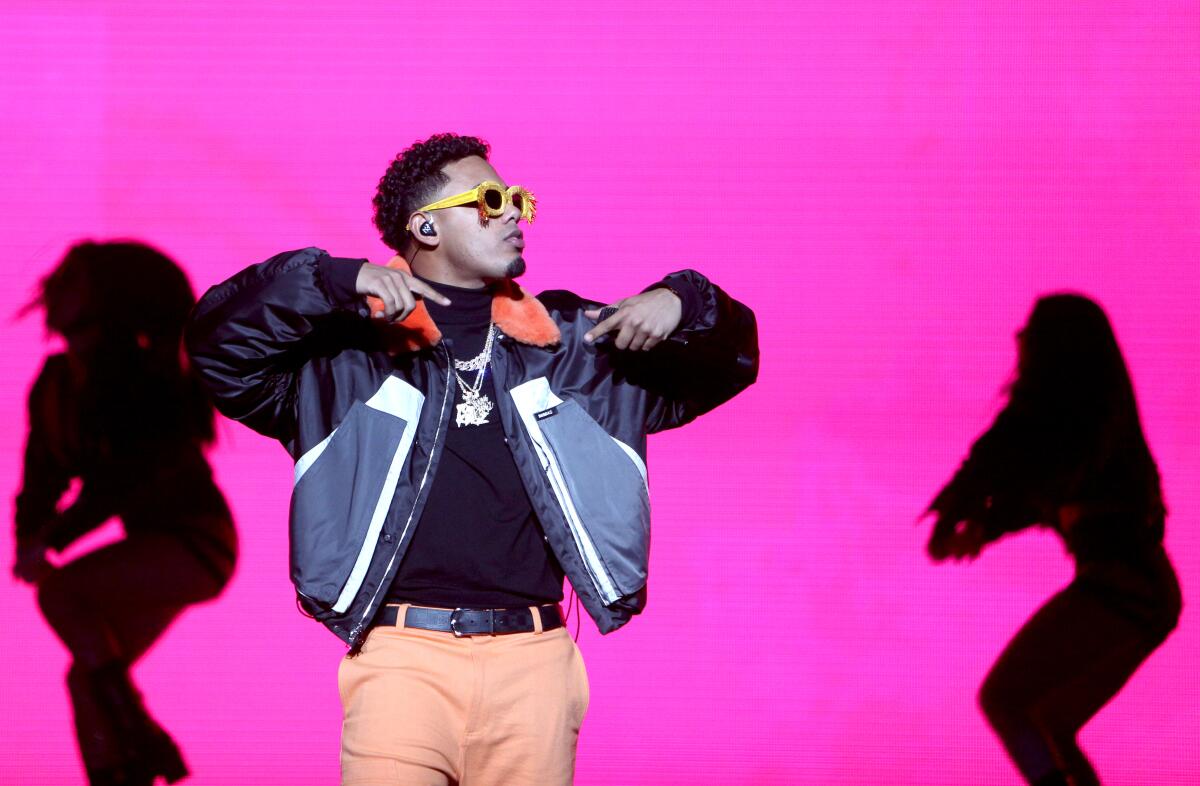
On his latest record, Towers’ melodic versatility becomes the focal point, as he coasts effortlessly through trap, Afrobeats and reggae sounds. And in collaborations with Daddy Yankee, Ozuna and J Balvin — reggaeton titans who expedited the genre’s crossover to the international mainstream through the 2010s — Towers, once a young king of Puerto Rico’s trap underground, now stakes his claim to a seat at their table.
The album comes 10 years since Towers took the stage at his first-ever performance, at a club in Old San Juan called Caliente; the trick to conquering stage fright on that fateful night in 2013, he explains, was the same one that has grounded him every night since.
“I didn’t see the stage as a stage,” he said. “I saw it as my first day on the job.”
On Friday, at the kickoff of her Eras tour, Swift performed a whopping 44 songs from all 10 of her studio albums, parceled out in distinct chapters.
For an island with a population of just 3.2 million people — fewer than the population of Los Angeles by more than half a million — Puerto Rico has left an enormous footprint on Latin popular music, from the 1960s salsa craze stoked by Willie Colón and Héctor Lavoe to the global pop primacy of Bad Bunny.
“We are the trendsetters,” said Towers. “We’ll be making the music that people will remember for 20 years on.”
Raised on foundational 2000s records by Don Omar and Tego Calderón, Towers is part of a rising tide of Puerto Rican MCs who are duking it out for prominence on the world stage. Of this new generation, Towers was the emerging artist worth betting on, says Hector Ruben Rivera, senior vice president and head of A&R at Warner Music Latina.
“His business is music, and he is serious about it,” said Rivera, who signed Towers in 2021. “His confidence and performance reminds me of the O.G. rappers from the U.S.”

Born Jan. 15, 1994, in the town of Río Piedras, home to the University of Puerto Rico, Towers grew up in neighboring Quintana, where he’d cycle through his parents’ reggaeton CDs, shoot hoops with his friends and narrowly avoid trouble with the authorities.
“I was a naughty kid,” he said. “And if I wasn’t doing bad things, I usually knew who the culprit was. I was the leader.”
At the behest of his friends, Towers recorded a handful of freestyles on SoundCloud, most of which “will never again see the light of day,” he says with a laugh. The oldest that remains is a hearty Spanish-language freestyle from 2014 titled “La Nueva Droga,” or “The New Drug,” which lifts the Alchemist’s piano loop from “Keep It Thoro,” the 2000 classic by New York rapper Prodigy.
“I was always drawn to the sound of hip-hop,” he said. “I studied it closely. At first that’s what I wanted to sound like, but obviously I had to adapt to what we do in Puerto Rico. I mean, I was born in the cradle of reggaeton.”
After captivating Puerto Rico’s trap underground with his 2016 mixtape, “El Final del Principio,” or “The End of the Beginning,” Towers spent the rest of the decade fortifying his catalog with collaborations with then-nascent stars like Eladio Carrión, Rauw Alejandro and Bad Bunny.

As trap and reggaeton became dominant forces in Latin music’s historic global expansion, Towers carefully considered his next move. He pivoted into the commercial Latin pop realm in 2019 with “Dollar,” a flirty collab with Chicana star Becky G; it wasn’t long before he fielded calls to work with Selena Gomez, Anitta and Cardi B.
Where another rapper might have identified such a move as a threat to his street cred, Towers found a new avenue for expression.
“I think of [making pop] like putting on a different hat, or a superhero suit,” he explained. “Like when the occasion calls to be romantic, I’ll be the romantic. Without getting into details ... it’s a very cold world we live in, you know? If you meet someone who brings out the best in you, you should enjoy it.”
In January 2020, Towers and his longtime girlfriend welcomed their first child, Shawn. It was, unsurprisingly, Towers’ idea to christen his son after his favorite rapper: Shawn “Jay-Z” Carter.
“My son became No. 1,” said Towers, who posed cradling Shawn on the cover of “Easy Money Baby.” Now 3 years old, Shawn is quick to mimic his father’s every move: “When I go to the barber for a haircut, he wants one too,” said Towers with a chuckle. “It is much more than giving him material things; [it’s] about working to give him that parental love. I had to put in a little discipline and sacrifice, but the reward is very great.”
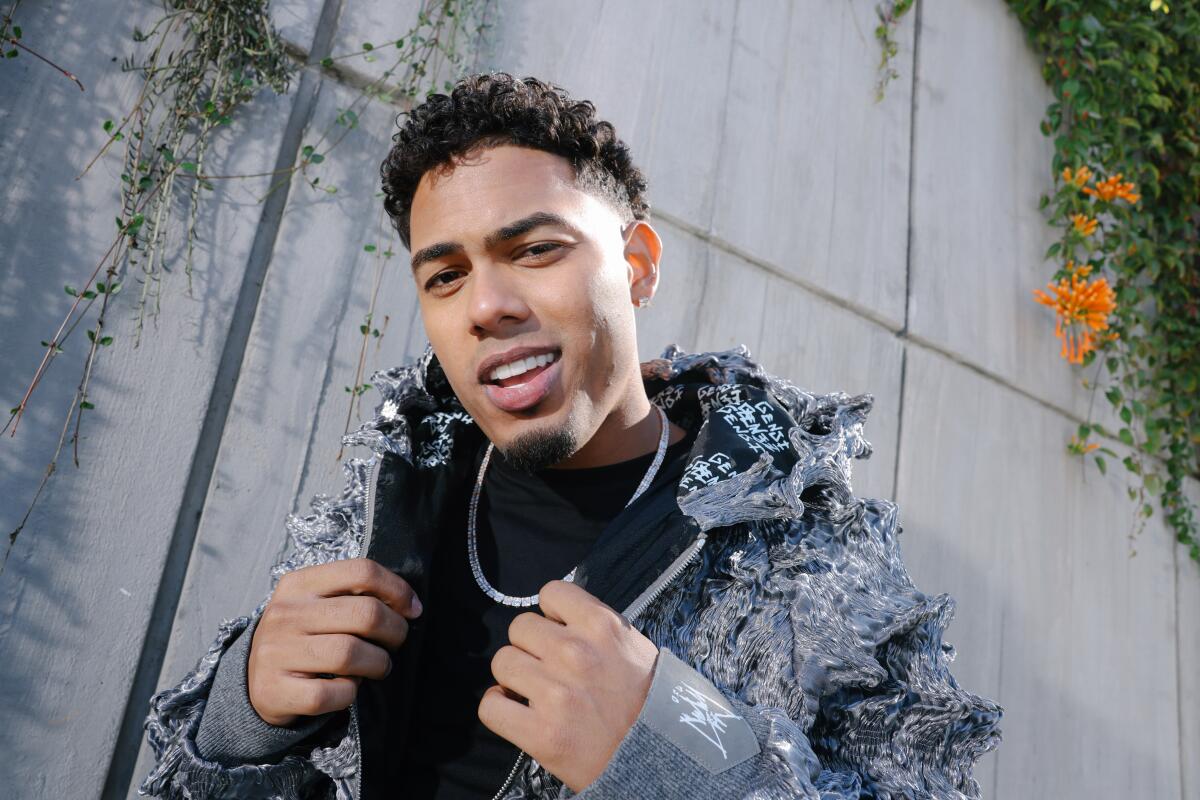
It was the discipline that Towers began to cultivate as a father that he says expedited his songwriting and, eventually, his professional ascent. “Easy Money Baby” climbed to the No. 1 spot on the Top Latin Albums chart and was nominated for urban music album at the 2020 Latin Grammys; six months later, he released his sophomore album, “Lyke Mike,” his major-label debut.
As the final chapter in what Towers calls his trilogy, “La Vida Es Una” is a testament to his maturation as a man and as an adventurous young artist from the Caribbean.
“I insert myself into different worlds from time to time, just to see what kind of essence it brings out in me” he said, noting that cuts like the synthy “Experimento” or the Afrobeats fusion of “Mundo Cruel” were inspired by sounds that were foreign to him. “I always bring it back to the Caribbean.”
The region’s musical past and present course through the new album, first in the bachata flourish of “Conocerte” with Ozuna; then in the Arcángel-assisted “Don y Tego,” a throwback to reggaeton’s Y2K-era vanguard; and in the reggae bounce of “Flow Jamaican,” which pays respect to reggaeton’s anglophone predecessors, Shabba Ranks and Bobby “Digital” Dixon.
“I know there’s a lot of controversy around where reggaeton started, but the roots of what we do come from Jamaica,” said Towers, who recorded the track with Jamaican producer Stephen “Di Genius” McGregor. “I want my songs to [reflect] the present while respecting their origins.... Everything is integrated in Puerto Rico, it’s a magical place.”
Bad Bunny tells James Corden he ‘learned a big lesson’ after arriving at Crypto.com arena approximately eight minutes before he opened the Grammys.
Colombian rapper J Balvin, a record-breaking artist who withdrew from the spotlight after his own son’s birth, makes a rare appearance with Towers on “Celos,” an effervescent reggaeton jam produced by Sky Rompiendo; and the since-retired Daddy Yankee joined Towers for one of his final recordings, “Ulala (Ooh La La).” “Yankee is the one who first recognized me,” said Towers, “and to this day, understands me.”
It was Towers’ collaborations with his reggaeton idols that spurred him to envision his own longevity and to impart some of the wisdom he’s gained to reggaeton’s next crop of innovators.
“Everyone wants to win, but not everyone wants to play hard,” said Towers. “I made this album with the hope of inspiring the next generation. People waste time when they don’t follow their dreams.”
More to Read
The biggest entertainment stories
Get our big stories about Hollywood, film, television, music, arts, culture and more right in your inbox as soon as they publish.
You may occasionally receive promotional content from the Los Angeles Times.
